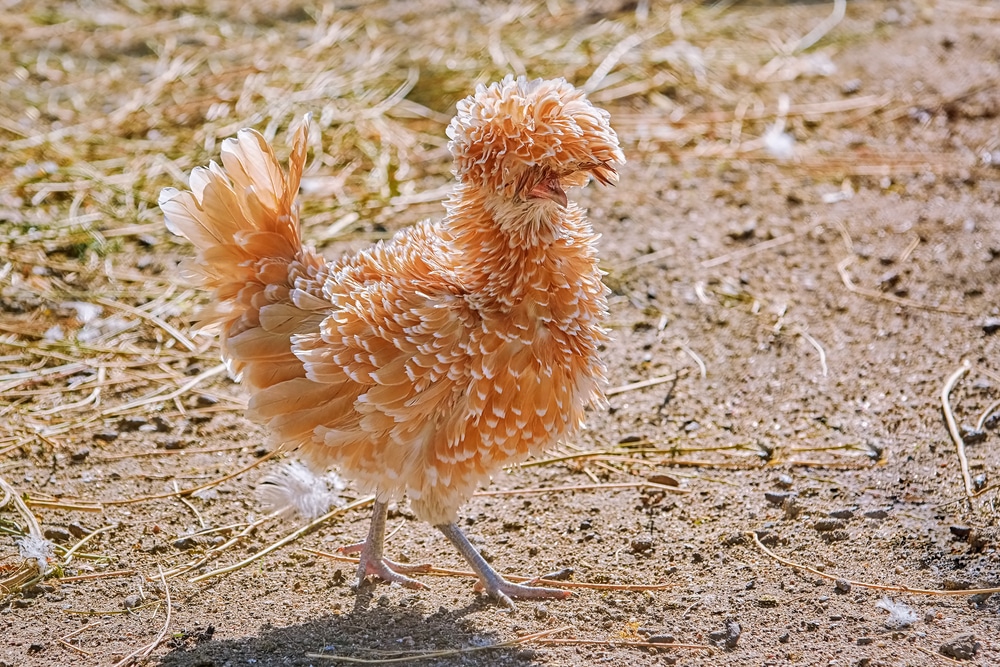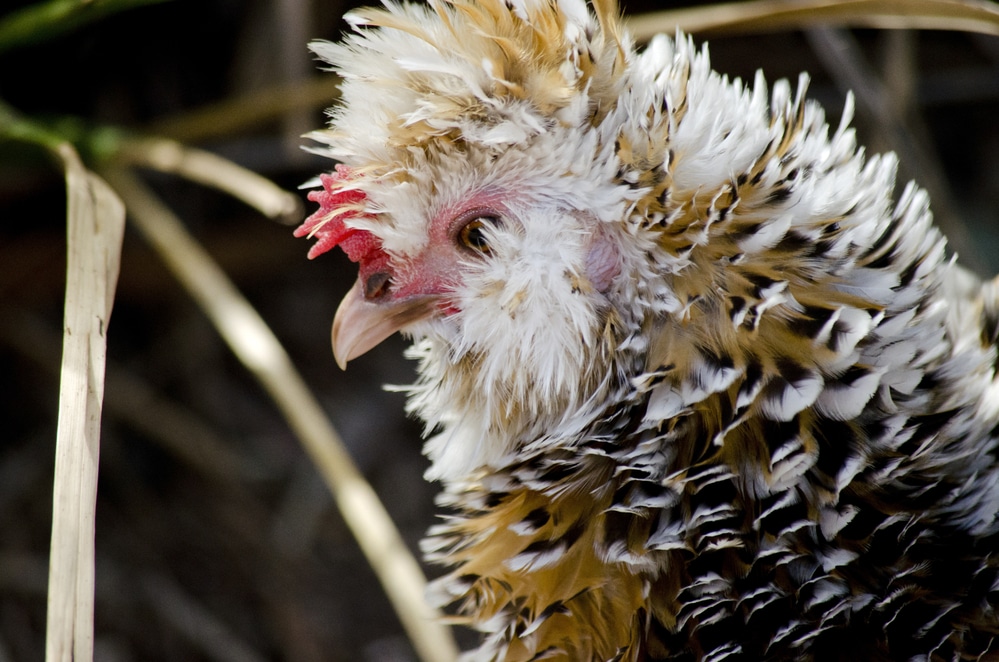Frizzle Chickens: The Fluffy, Feathered Delight That's Got Everyone Talking
If you're diving into the world of backyard chickens or simply fascinated by unique poultry breeds, frizzle chickens are here to steal your heart. These fluffy birds aren't just a pretty face; they're a delightful addition to any flock. With their signature curly feathers, frizzle chickens are more than just eye candy—they're a symbol of charm and personality wrapped in a feathery package. So, let's dive right in and uncover what makes these birds so special!
Frizzle chickens have been turning heads for years, and it's easy to see why. Their quirky appearance and friendly demeanor make them a favorite among chicken enthusiasts worldwide. Whether you're a seasoned poultry keeper or a curious beginner, these birds offer something truly unique that will leave you wanting more.
But what exactly makes frizzle chickens so special? Is it their feathers, their temperament, or their ability to bring joy to anyone who meets them? In this article, we'll explore everything you need to know about frizzle chickens, from their origins to their care requirements. So grab a cup of coffee, sit back, and let's get to know these feathered wonders!
Read also:Times Health Mag Your Ultimate Guide To Health And Wellness
What Are Frizzle Chickens? Understanding the Basics
Frizzle chickens are not just another pretty face in the poultry world. These birds are known for their distinctively curled feathers, which give them a fluffy, almost whimsical appearance. But there's more to these chickens than meets the eye. Frizzles can come in a variety of breeds, and their unique feathering is caused by a genetic mutation. This mutation causes the feathers to grow outward and upward, creating their signature look.
Where Did Frizzle Chickens Come From?
The origins of frizzle chickens are a bit of a mystery, but historians believe they may have originated in Southeast Asia. Some records suggest that frizzled chickens were first documented in the 1300s in China, but the exact timeline is unclear. Over time, the frizzle gene spread across the globe, and today, it can be found in many popular chicken breeds, including Silkies, Cochins, and Plymouth Rocks.
Interestingly, not all frizzle chickens are purebred. In fact, many are the result of crossbreeding, which has led to a wide variety of sizes, colors, and temperaments. This diversity makes frizzle chickens even more appealing to hobbyists and breeders alike.
Why Are Frizzle Chickens So Popular?
If you've ever seen a frizzle chicken in person, you'll understand why they've become such a sensation. Their fluffy feathers and playful personalities make them irresistible. But popularity aside, there are practical reasons why frizzle chickens are beloved by many.
- Unique Appearance: Their curled feathers make them stand out in any flock.
- Friendly Temperament: Frizzle chickens are known for being gentle and easy to handle.
- Great for Show: Many poultry enthusiasts use frizzle chickens in competitions due to their striking looks.
- Low Maintenance: Despite their fancy feathers, frizzle chickens don't require much extra care compared to regular chickens.
While they may not be the best egg layers, frizzle chickens more than make up for it with their charm and character. They're perfect for families, hobbyists, and anyone looking to add a touch of personality to their backyard.
How to Care for Your Frizzle Chickens
Like any pet, frizzle chickens require proper care and attention. While they're generally low-maintenance, there are a few things you should keep in mind to ensure your feathery friends stay happy and healthy.
Read also:Pablo Escobar Daughter The Untold Story Of A Legacy In Shadows
Shelter and Environment
Frizzle chickens need a safe and comfortable place to live. Their curled feathers can make them more susceptible to the elements, so it's important to provide them with a well-insulated coop. During colder months, you may need to add extra bedding or heating to keep them warm. Similarly, during hot weather, ensure they have access to shade and fresh water.
Diet and Nutrition
A balanced diet is essential for the health of your frizzle chickens. They should be fed a high-quality chicken feed that provides all the necessary nutrients. You can also supplement their diet with treats like fruits, vegetables, and mealworms, but be sure not to overdo it. Overfeeding can lead to obesity and other health issues.
Health and Grooming
While frizzle chickens don't require regular grooming like dogs or cats, you should still keep an eye on their feathers. Their curled plumage can trap dirt and debris, so occasional cleaning may be necessary. Additionally, watch out for signs of illness, such as lethargy, reduced appetite, or unusual behavior. If you notice anything out of the ordinary, consult a veterinarian who specializes in poultry care.
Frizzle Chickens in Popular Culture
Frizzle chickens have made their way into pop culture, thanks to their quirky appearance and charm. You might have seen them in movies, TV shows, or even social media platforms like Instagram and TikTok. Their fluffy feathers and playful personalities make them perfect for the camera, and many poultry enthusiasts love sharing photos and videos of their frizzle chickens online.
One famous frizzle chicken, named "Feathers McGraw," even gained internet fame for his antics and good looks. With thousands of followers, Feathers McGraw became a symbol of the frizzle chicken's growing popularity. Who knew a chicken could become an internet sensation?
Types of Frizzle Chickens
Not all frizzle chickens are created equal. There are several breeds that can exhibit the frizzle trait, each with its own unique characteristics. Here are a few popular types of frizzle chickens:
- Silkie Frizzles: Known for their fluffy, soft feathers, Silkies are a favorite among frizzle enthusiasts.
- Cochin Frizzles: These large, fluffy birds are perfect for show and have a gentle temperament.
- Plymouth Rock Frizzles: A classic American breed with a frizzle twist, these chickens are hardy and adaptable.
- Orpington Frizzles: With their luxurious feathers and friendly nature, Orpingtons are a great choice for beginners.
Each breed brings something special to the table, so it's worth doing some research to find the perfect frizzle chicken for your flock.
The Science Behind Frizzle Feathers
What causes those signature curled feathers? It all comes down to genetics. The frizzle trait is caused by a dominant gene, meaning that if a chicken inherits this gene from one or both parents, it will exhibit the frizzle characteristic. However, not all frizzle chickens have the same level of curliness. Some have tightly curled feathers, while others have a more relaxed wave.
Interestingly, the frizzle gene can also affect a chicken's overall health and appearance. For example, chickens with too much curl may struggle with temperature regulation, making them more sensitive to extreme weather conditions. This is why it's important to carefully select breeding pairs to ensure the health and well-being of future generations.
Frizzle Chickens in Competitions
If you're a poultry enthusiast, you might already know that frizzle chickens are a favorite in poultry shows. Their unique appearance and friendly demeanor make them stand out in a crowd. Many competitions have specific categories for frizzle chickens, and judges look for traits such as feather quality, body shape, and overall presentation.
While not all frizzle chickens are bred for show, those that are can command high prices. Some top-tier frizzle chickens have sold for thousands of dollars, making them a valuable asset for serious breeders.
Challenges of Owning Frizzle Chickens
Despite their charm, frizzle chickens do come with a few challenges. One of the biggest concerns is their susceptibility to extreme weather. Their curled feathers can make it harder for them to regulate their body temperature, so you'll need to take extra precautions during hot or cold spells. Additionally, their feathers can trap dirt and debris, requiring occasional cleaning to keep them looking their best.
Another challenge is finding high-quality frizzle chickens. Due to their popularity, there are many breeders who prioritize appearance over health and temperament. It's important to do your research and find a reputable breeder who prioritizes the well-being of their birds.
Where to Buy Frizzle Chickens
So, you've decided to add a frizzle chicken to your flock. Now what? The first step is finding a reputable breeder or supplier. There are several ways to locate frizzle chickens, including:
- Local Breeders: Check with local poultry clubs or breeders in your area. They often have a wide selection of frizzle chickens available.
- Online Marketplaces: Websites like Craigslist, Facebook Marketplace, and specialized poultry forums can be great resources for finding frizzle chickens.
- Poultry Shows: Attending poultry shows is a great way to meet breeders and see frizzle chickens in person.
When purchasing frizzle chickens, be sure to ask plenty of questions about their health, temperament, and breeding history. This will help ensure you're getting a quality bird that will thrive in your flock.
Conclusion: Why Frizzle Chickens Are Worth the Hype
Frizzle chickens are more than just a passing trend; they're a delightful addition to any flock. With their unique appearance, friendly personalities, and growing popularity, it's no wonder these birds have captured the hearts of poultry enthusiasts worldwide. Whether you're a seasoned breeder or a curious beginner, frizzle chickens offer something special that will leave you smiling every time you see them.
So, what are you waiting for? Dive into the world of frizzle chickens and discover the joy they can bring to your life. And don't forget to share your experiences with others—after all, the more people who appreciate these feathered wonders, the better!
Table of Contents
- What Are Frizzle Chickens? Understanding the Basics
- Where Did Frizzle Chickens Come From?
- Why Are Frizzle Chickens So Popular?
- How to Care for Your Frizzle Chickens
- Frizzle Chickens in Popular Culture
- Types of Frizzle Chickens
- The Science Behind Frizzle Feathers
- Frizzle Chickens in Competitions
- Challenges of Owning Frizzle Chickens
- Where to Buy Frizzle Chickens
Article Recommendations


